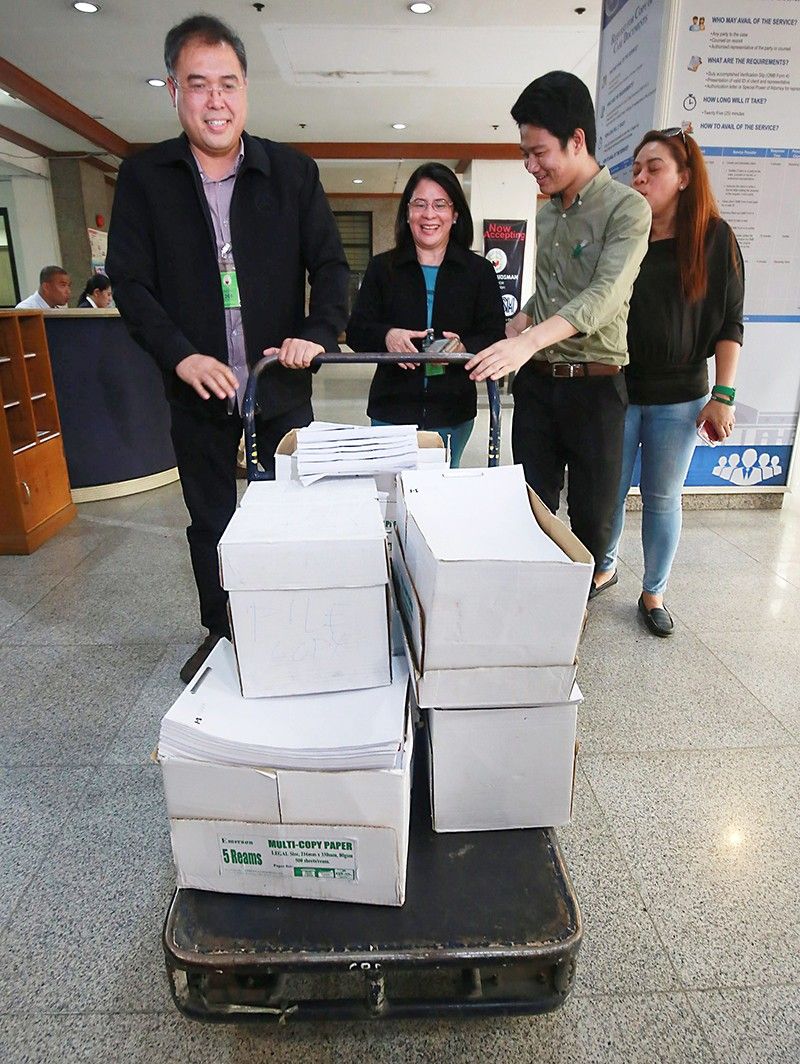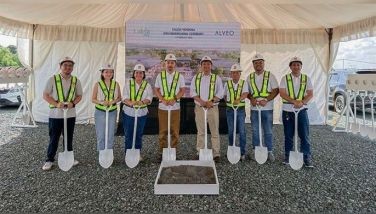Boracay raps filed vs 17 Aklan execs

DILG: Duterte to find replacements if suspended by ombudsman
ILOILO CITY, Philippines — A total of 17 officials of Aklan province and Malay town were charged yesterday before the Office of the Ombudsman for neglect of duty that led to Boracay Island’s environmental crisis.
President Duterte may replace the officials if they are suspended by the ombudsman, according to Department of the Interior and Local Government (DILG) Undersecretary Epimaco Densing III.
Charged were Gov. Florencio Miraflores; Provincial Environment and Natural Resources Officer Valentin Talabero; Malay Mayor Ciceron Cawaling; Malay Vice Mayor Abram Sualog; Sangguniang Bayan members Natalie Cawaling-Paderes, Jupiter Aelfred Gallernero, Frolibar Bautista, Lloyd Maming, Dalidig Sumdad, Maylynn Graff, Danilo delos Santos and Dante Pagsuguiron; Malay licensing officer Jen Salsona; Municipal Environment and Natural Resources Officer Edgardo Sancho; and barangay captains Hector Casidsid of Yapak, Chona Gabay of Manoc-Manoc and Lilibeth Sacapaño of Balabag.
Also charged were several John and Jane Does.
The 17 were administratively charged under the Local Government Code for gross neglect of duty, conduct unbecoming of a public officer, conduct prejudicial to the best interest of the service and grave misconduct.
Paderes, Salsona, Talabero, Sancho and the three barangay captains were also criminally charged for violation of Republic Act 3019 or the Anti-Graft and Corrupt Practices Act.
In an interview with reporters after filing the complaints, Densing said Miraflores must be held liable with the officials of Malay as he has the “general supervision over all component cities and municipalities in the province of Aklan.”
The complaints against the municipal officials stemmed from their alleged issuance of business permits to more than 2,000 establishments despite the lack of necessary documents, such as fire safety clearance and National Building Code compliance certificate.
Densing said from March to May this year, his team conducted physical investigation on the 2,269 establishments operating in Boracay and found that only 95 of them were fully compliant with fire safety, building safety and environmental safety standards.
“More than half of the establishments there have no mayor’s permit and I think 360-plus (establishments) have no environmental compliance certificate,” Densing said.
Densing added that more than half of the establishments were also not paying their employees’ contributions to the Social Security System, Bureau of Internal Revenue and Pag-IBIG Fund.
“Even the local employees working there are not receiving benefits. They are being taken advantage of by these businessmen,” Densing said.
Densing added that the Commission on Audit will also look into the environmental fees collected in Boracay in the last five years.
“We would look into how much was collected and how it was utilized,” he said.
Meanwhile, Task Force Boracay is set to meet next month to discuss the soft opening of the island on Oct. 26.
“We want to define the soft opening – which establishments will be allowed to operate,” Densing said.
He added that some members of the Cabinet who are not part of the task force have indicated their intention to attend.
Agro-tourism site
For its part, the Department of Agriculture (DA) is transforming a two-hectare ancestral land in Boracay into an agro-tourism site as part of the government’s efforts to lift indigenous people from poverty and rehabilitate the island at the same time.
Agriculture Secretary Emmanuel Piñol said the Ati tribe in Boracay will adopt the Kabuhayan at Kaunlaran ng Kababayang Katutubo (4Ks) program, which will develop thousands of hectares of ancestral domain into tree farms with profitable crops.
“Part of the two-hectare area of the Boracay Ati will be transformed into a vegetable production area using a solar-powered greenhouse and dairy goat milk parlor, while a portion will be used for the establishment of an organic restaurant or eatery where indigenous recipes could be offered to tourists,” Piñol said.
“With funds coming from the DA and assisted by workers of the Agricultural Training Institute, a tribal-inspired hostel complete with facilities for trainings and seminars will also be established,” he added.
The 4Ks program aims to help tribal people contribute to better food production in the country.
“The whole area is envisioned to become a tourist destination in itself, with the Ati people benefitting from the influx of tourists who I believe would be interested to have a taste of indigenous food, stay in a tribal-designed hostel or have a taste of organically produced milk and dairy products,” Piñol said.
4Ks include the planting of industrial trees like falcata to be intercropped with coffee, cacao, black pepper, abaca and root crops like organic ube (purple yam) and camote (sweet potato).
DA estimates that after two years, the 4Ks program will start earning at least P100,000 per hectare every year, with the bulk of income coming on the fifth year when the industrial trees are harvested and expected to earn at least P1 million per hectare.
The department is targeting an initial area of 100,000 hectares for 20,000 families. – With Elizabeth Marcelo, Cecille Suerte Felipe, Louise Maureen Simeon
- Latest
- Trending


























